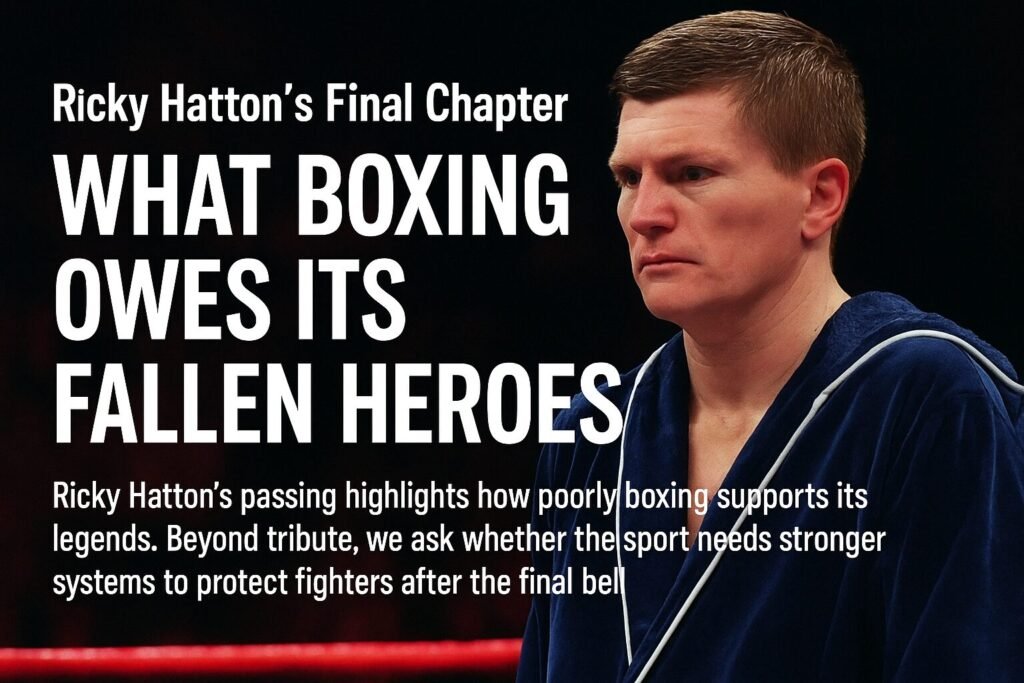Remembering the People’s Champion
Few fighters connected with fans like Ricky Hatton. He wasn’t just a world champion; he was the lad from Manchester who made it to the biggest stages in Vegas. His ring walks were legendary, his body shots brutal, and his loyal following unmatched.
His passing is a sad day for boxing. But it’s also a reminder of something bigger: the sport’s long-standing failure to support its fighters once the crowd goes home.
Read our full tribute to Ricky Hatton here.
The Silence Outside the Ring
Boxing is still a male-dominated sport, shaped by old-school ideas of toughness. For generations, fighters were told to grit their teeth, hide their pain, and never admit weakness. That mindset doesn’t just vanish when careers end.
The result? Too many former champions suffer in silence. Financial struggles, lasting injuries, and mental health battles often go unseen. And it’s not just boxing—men across society are still far less likely to open up when they’re struggling.
Hatton’s passing underlines this wider truth. It shouldn’t take losing a legend for the sport to ask serious questions about how it treats its own.
Boxing’s Legacy Duty
If we’re going to talk about boxing legacy duty, it has to mean more than statues, tribute nights, or Hall of Fame ceremonies. It has to mean looking after the men and women who made the sport what it is.
Right now, that duty is being shouldered by charities like Ringside Charitable Trust, which offers support for ex-fighters in need. Their work is vital, but it shouldn’t be left to goodwill alone. When promoters, broadcasters, and sanctioning bodies make millions from fight nights, there’s no excuse for not carving out a percentage to build long-term safety nets.
Lessons from Other Sports
Other sports aren’t perfect, but they’ve built systems boxing can learn from:
- Football: In England, the Professional Footballers’ Association (PFA) funds education, retraining, and counselling for ex-players. There’s a pension scheme, and retired footballers can access support even decades after hanging up their boots.
- Rugby: The Rugby Players’ Association provides concussion support, welfare officers, and transition programmes for life after the game. Mental health campaigns are front and centre, helping break down stigma.
- Cricket: The Professional Cricketers’ Association runs a confidential helpline, career development courses, and financial planning services for its members.
These systems don’t stop every problem, but they acknowledge the duty of care. Boxing has never managed to build anything like it, mainly because the sport is so fragmented between promoters, TV networks, and sanctioning bodies. But that’s no excuse.
Breaking Down the Stigma
Support isn’t just about money. It’s about changing a culture where asking for help is still seen as weakness. The truth is the opposite—it takes enormous strength to admit when you’re struggling.
Here, women’s boxing might actually lead the way. Many female fighters have spoken openly about juggling careers, family life, and the pressure of competing at the highest level. Their honesty could help shift the culture across the sport, if promoters and pundits give it the platform it deserves.
Boxing doesn’t need to lose more heroes before it admits this: silence can be as dangerous as a knockout punch.
Carrying Ricky’s Memory Forward
Ricky Hatton’s legacy is secure. His nights in Manchester and under the Vegas lights will never be forgotten. But if the sport really wants to honour him—and every fighter who gave everything—it has to do more than remember.
It has to act. That means financial security, medical aftercare, and breaking down the macho walls that stop fighters from speaking out. Because legacy isn’t just belts and trophies. Legacy is duty. And boxing’s legacy duty is to protect its heroes long after the final bell.
Your Turn
Do you think boxing does enough for its retired fighters? Or should the sport finally start building real support systems like other sports have?
Share your thoughts, spread this article, and head to CMBoxing for more opinion pieces, tributes, and debates about the future of the sport we love.

